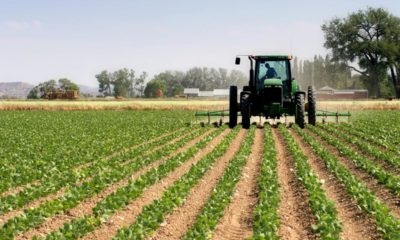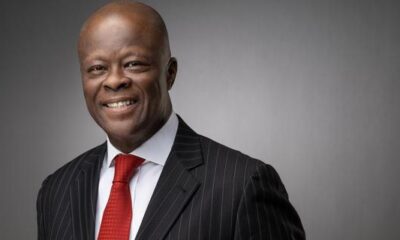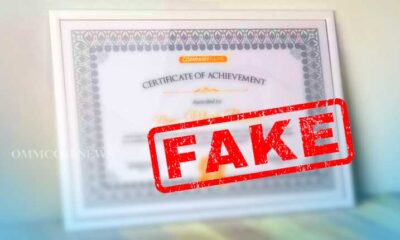Finance
NLC, Experts Lambast FG Over High Rail Projects’ Cost
Published
6 years agoon

- NLC, Experts Lambast FG Over High Rail Projects’ Cost
The Nigeria Labour Congress, the Centre for Social Justice and other economic analysts have lambasted the Federal Government over the high cost of rail projects under construction in parts of Nigeria.
According to them, the costs of such projects in other African countries are far lower than what obtains in Nigeria, as they described the development as worrisome and unfortunate.
Their reactions were prompted by the recent announcement that Ghana signed a Memorandum of Understating with China Railway Construction Corporation to build a 560km railway line for a contract price of $2bn, while Nigeria is spending the same $2bn on 156km Lagos-Ibadan rail project, which is being constructed by the China Civil Engineering Construction Corporation.
Commenting on the development, the Secretary-General, NLC, Peter Ozo-Esan, told our correspondent, “There has been a general worry about cost competitiveness in infrastructural development in Nigeria. Historically, we have always noticed that the construction of roads and the development of other infrastructure in Nigeria cost multiple times more than the cost in other countries and this is worrisome.
“There is no doubt at all that rail development is very welcomed and there is a need to invest more. However, this needs to be done in a cost-effective manner so that we get value for our money.”
He added, “I have also heard of comparison between what is done in Ethiopia and Nigeria in rail development by the Chinese as well and in every case, the cost is always highest in Nigeria and that is extremely worrisome. The Lagos-Ibadan axis is not a coastal area for you to say it is affected by terrain.
“So I think the whole issue of how transparent our budgetary process is and our tendering process and what we pay for infrastructural development need to be visited very squarely if we are to benefit and develop from investments in these areas.”
Ozo-Esan noted that those who brought the facts from the international arena for comparison were doing the country a lot of good, adding that the NLC “will stand to support any call for the government to defend the type of figures that they give and the type of cost that they place on this infrastructure.”
The Lead Director, CSJ, Eze Onyekpere, described the situation in Nigeria as unfortunate, stressing that the Lagos-Ibadan area was not a coastal area and should not warrant such huge fund, judging by what Ghana would spend on its over 500km railway project.
He said, “My first reaction is that there are international benchmark prices for doing kilometres of either roads or rail lines across similar terrains. Once the environment and ecological conditions are the same, it is expected that the cost should be the same.
“But if they differ, it may cost more to do it on maybe wetlands and the kind of environment we have in the Niger Delta, compared to if you are doing it on drylands like Abuja. But beyond that, it does appear that what we have in Lagos-Ibadan is not particularly challenging terrain.”
Onyekpere added, “It is quite a dry zone and what we understand is happening in Ghana is also the same dry land. So on the surface of it, you will understand that some mischief has happened. The contract must have been over-invoiced or there is corruption and some people may have made so much from it.
“So, it is a very crooked situation because we have a closed-door procurement system where due process and value for money are only on paper and have nothing to do with the actual value for money. It is an unfortunate scenario.”
A former President, Association of National Accountants of Nigeria, Dr Sam Nzekwe, said the Federal Government failed to thoroughly go through the terms of agreement with China before entering into railway construction agreements.
He said, “In many of the agreements between Nigeria and China, our country was not able to thoroughly look at the terms. This is because, in the agreements for the rail sector, you will observe that the machinery, rail tracks and almost every other thing about the rail were given to China.
“We’ve noticed that the tracks, bolts, nuts, machines and some good amount of labour are all coming from China. So the Asian country factored everything into the agreements, which our people here in Nigeria did not look at critically.”
Nzekwe added, “So technically, Nigeria has paid that loan but she still owes the money. China is coming with everything, as well as raw materials for the projects and there is no local content in the agreements. Our ministers and government got it wrong when it comes to factoring local content in the agreements.
“Are you saying we cannot manufacture a good number of things being used for the construction of those rail lines? Why is local content so low in the construction of the rail lines? The ministers and government officials who signed those contracts are all jokers.”
Another analyst stated that it was annoying to know that ministers and government officials in Nigeria failed to scrutinise the details of the agreement with China for the various railway construction projects.
“I’ve seen that story about Ghana and what it signed with the Chinese construction company and it is sad that we are spending such amount for a similar project that is far less than what is to be constructed in Ghana,” the analyst, who preferred not to be named due to his level of involvement with the government, stated.
“Our politicians are really failing us and this is so annoying. We hope there will be some form of probe of this issue,” the analyst added.
It was recently reported that Ghana’s moribund railways’ infrastructure received a reconstruction funding of $2bn following the MoU signed by Ghana’s Minister of Railways Development and CRCC, a Chinese construction conglomerate.
However, Ghana’s Minister of Railway Development, Joe Ghartey, said the MoU with the China Railway Construction Corporation Corporation (International) Nigeria Limited (CRCC-Nigeria) has been cancelled “for breach of confidentiality.”
Ghana had signed an MoU with CRCC- Nigeria for the construction and rehabilitation of a 560-kilometre standard gauge railway line.
However, after a report in an online newspaper, TheCable, comparing railway contract costs in Ghana with Nigeria’s, the minister came under pressure to do “damage control.”
In a statement sent to TheCable on Monday, Ghartey was said to have acknowledged that the ministry signed an MoU with CRCC-Nigeria.
TheCable had reported that CRCC offered to rehabilitate and construct a 560-kilometre standard gauge railway line for Ghana at $2bn, with terminals at Aflao and Elubo.
“Messrs CRCC-Nigeria expressed interest in supporting the ministry to develop and modernise Ghana’s railway network, particularly the Trans-ECOWAS line, which runs along the coast between Aflao, on the border with Togo, and Elubo, on the border with Cote d’Ivoire,” the statement read.
“The purpose of the MoU is for CRCC-Nigeria to undertake feasibility studies through the use of independent consultants.
“CRCC-Nigeria is responsible for verifying the project cost as estimated by the feasibility studies and also raise capital to finance the project.”
However, the minister said his ministry had yet to respond to a proposal by CRCC-Nigeria to establish assembly plants for building locomotive coaches and wagons.
Is the CEO and Founder of Investors King Limited. He is a seasoned foreign exchange research analyst and a published author on Yahoo Finance, Business Insider, Nasdaq, Entrepreneur.com, Investorplace, and other prominent platforms. With over two decades of experience in global financial markets, Olukoya is well-recognized in the industry.

You may like
-


Federal Government Tackles Food Insecurity with Farm Equipment for Katsina Farmers
-


FG Disburses N5.3 Billion in Intervention Scheme to Alleviate Economic Hardship
-


FG, World Bank Agrees $700m Deal To Boost Rural Agriculture, Others
-


FG Allocates N700 Billion to Provide Free Electricity Meters Nationwide
-


Federal Government Unveils N198 Billion Loan Scheme to Empower Nigerian Entrepreneurs
-


FG Cracks Down on Fake Certificates: Over 22,000 Civil Servants Under Scrutiny







